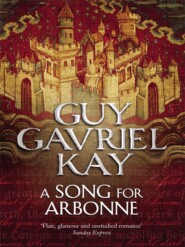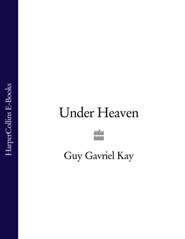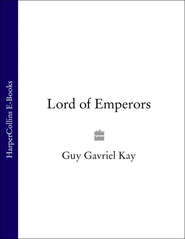По всем вопросам обращайтесь на: info@litportal.ru
(©) 2003-2025.
✖
Ysabel
Автор
Год написания книги
2018
Настройки чтения
Размер шрифта
Высота строк
Поля
Melanie had gone into the kitchen. She came back out with ice cubes in a plastic bag, a dish towel wrapped around them. She handed it to him, wordlessly.
“My own fault, probably,” Ned said. “I was jogging through the market and who knows what the dog thought I was. A terrorist or something.” His father looked dubious. “I’m okay, really. A bruise. I’ll live, Dad.” He held the ice dutifully to his face.
“What about earlier?” his father asked. “On the drive?”
He really did have a lot to explain. “That was weird,” Ned said. “And then it totally went away. Don’t say food poisoning or Veracook will kill herself.”
“We all ate the same food, anyhow,” Melanie said. “I’m thinking motion sickness after jet lag.”
Ned managed a grin. “You just keep thinking, Butch, that’s what you’re good at.”
Steve laughed. Movie joke. Ned saw that his father was still eyeing him.
“I’m fine, Dad. Honestly. How did it go at lunch?”
Edward Marriner leaned back in his chair. “Very pleasant. Perfectly likable man. Likes his wine. He said he saw the book as more mine than his, so I said the opposite and we got on like a house on fire.”
“Where does that expression come from, anyhow?” Greg asked, of no one in particular.
No one answered. Ned relaxed a little. He heard birds from the slope above the house. Aix gleamed below them, down the valley in the late daylight.
“This,” said Steve, looking the same way, “is pretty cool, have to say.”
It was, Ned thought. There were at least a couple of more hours before sunset, but the light was already turning everything an amber hue and the shadows of the cypresses were falling vividly across the grass.
“I told you,” he said, “you guys were a photograph up here—for your own albums.” A thought occurred to him. “Dad, if you tried Barrett’s money shot right around now the mountain would look pretty goddamned unbelievable.”
“Language, Ned,” his father said, absent-mindedly. “Your mother’s calling soon.”
“Right. And God forbid I swear within an hour of talking to her. She’ll know!”
Steve laughed again.
His father grinned. “Touché. Steve said Barrett’s would be a tourist shot.”
“Maybe not at this hour,” Steve said. “Ned could be right. And those plane trees we told you about—if you didn’t shoot down the alley but across, from the west, with the sun on them, their shadows, maybe an hour later than this…”
“We’ll have a look,” Ned’s father said. “One day when the light looks right we’ll drive out. If I buy it, we can arrange to set up another time. It’s only—what?—twenty minutes from here.”
“Bit more,” said Melanie. “Ned, keep the ice on your cheek.”
Ned put the ice back. It was really cold. He knew what she’d say if he said that. How did someone with a punk look and green-streaked hair get so efficient, that’s what he wanted to know.
“How was the hot date?” Greg asked. “Before the dog had to beat you off her.”
“It wasn’t hot or a date. But it was fine,” Ned said, repressively. There were limits.
“Who is this?” his father asked, predictably.
Ned gave him a look. “Her name’s Lolita LaFlamme, she’s a stripper at the HotBooty Club in town. She’s thirty-six and studying nuclear physics in her spare time.”
Melanie giggled. Edward Marriner raised an eyebrow.
“I do sometimes forget,” his father said slowly, brushing at his moustache with one hand, “that amid the blessings of my life, which are many and considerable, I am raising an adolescent son. Having had your brief moment of dubious wit, my child, could you enlighten me more cogently?”
His father talked like that to be funny, Ned knew. He wasn’t actually upset. You had no doubts when his dad was really angry.
Ned sighed, rattled it off. “Kate Wenger, my age, here for a term at school, exchange from New York. Met her yesterday. Student-geek type. Giving me some help with one of my essays.”
That last, he realized—too late—was a mistake.
Larry Cato would have shaken his head sorrowfully. Dude, never tell more than you need to, he’d have said.
“Ah. Some help? I believe I know what that means. Are you going to copy her paper?”
His father asked it mildly. His mom would have gone ballistic.
“Of course he’s going to copy her paper!” Greg said. “Jeez, cut him some slack, boss, he’s in the south of France!”
“I do know his approximate geographic location,” Ned’s father said, trying to sound stern. He looked at his son a moment. “Very well. Here’s our deal, Ned: you can get notes for one paper from this girl, the other two you write yourself. Fair?”
“Fair.”
It was, especially since they had no way of checking on him. Larry would have called it a no-brainer, flat-out win.
“And no one tells your mother or we’re both in trouble.”
“You think I’m going to tell her?”
“I might,” said Melanie cheerfully, “if some unnamed people aren’t nicer to me.”
“Blackmail,” said Ned darkly, “is a crime, threatening the peace and security of the world.”
On cue, the phone rang inside.
“Shall I get that?” Melanie said sweetly.
But even as she spoke, Edward Marriner was out of his chair and moving through the terrace doors.
They all looked at each other. He’d gone in very fast. It made Ned think for a moment. He wasn’t, obviously, the only one worried about his mother, waiting for that call.
After a bit, as the other three remained silent, he got up and went quietly into the kitchen. His father was at the table they’d set up against the wall in the dining room where the main computer and a telephone were.
Bending to grab an apple from the fridge, Ned could hear his father’s voice. He washed the apple at the sink. Veracook smiled at him again.
Ned heard his dad saying, “That’s not especially far from shelling, Meghan.”
And after a pause, dryly, “Oh, fine then, if someone said they’re going the other way.”











